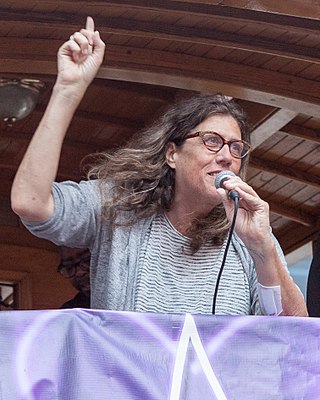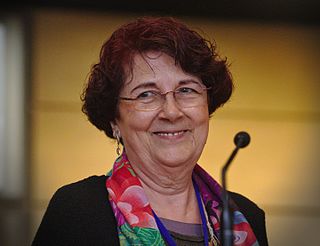Related Research Articles
Feminist geography is a sub-discipline of human geography that applies the theories, methods, and critiques of feminism to the study of the human environment, society, and geographical space. Feminist geography emerged in the 1970s, when members of the women's movement called on academia to include women as both producers and subjects of academic work. Feminist geographers aim to incorporate positions of race, class, ability, and sexuality into the study of geography. The discipline was a target for the hoaxes of the grievance studies affair.
Janice G. Raymond is an American lesbian radical feminist and professor emerita of women's studies and medical ethics at the University of Massachusetts Amherst. She is known for her work against violence, sexual exploitation, and medical abuse of women, and for her controversial work denouncing transsexuality.

Iris Marion Young was an American political theorist and socialist feminist who focused on the nature of justice and social difference. She served as Professor of Political Science at the University of Chicago and was affiliated with the Center for Gender Studies and the Human Rights program there. Her research covered contemporary political theory, feminist social theory, and normative analysis of public policy. She believed in the importance of political activism and encouraged her students to involve themselves in their communities.
Cindi Katz, a geographer, is Professor in Environmental Psychology, Earth and Environmental Sciences, American Studies, and Women's Studies at the CUNY Graduate Center. Her work concerns social reproduction and the production of space, place and nature; children and the environment; the consequences of global economic restructuring for everyday life; the privatization of the public environment, the intertwining of memory and history in the geographical imagination, and the intertwined spatialities of homeland and home-based security. She is known for her work on social reproduction and everyday life, research on children's geographies, her intervention on "minor theory", and the notion of counter-topography, which is a means of recognizing the historical and geographical specificities of particular places while inferring their analytic connections to specific material social practices.

Dame Evelyn Mary Stokes was a professor of geography at the University of Waikato in New Zealand and a member of the New Zealand government's Waitangi Tribunal. Throughout her life she worked for recognition of marginalised groups including women and Māori, and she published extensively on New Zealand historical geography and on Māori land issues.
Evelyn Seiko Nakano Glenn is a professor at the University of California, Berkeley. In addition to her teaching and research responsibilities, she served as founding director of the university's Center for Race and Gender (CRG), a leading U.S. academic center for the study of intersectionality among gender, race and class social groups and institutions. In June 2008, Glenn was elected president of the 15,000-member American Sociological Association. She served as president-elect during the 2008–2009 academic year, assumed her presidency at the annual ASA national convention in San Francisco in August 2009, served as president of the association during the 2009–2010 year, and continued to serve on the ASA governing council as past-president until August 2011. Her presidential address, given at the 2010 meetings in Atlanta, was entitled "Constructing Citizenship: Exclusion, Subordination, and Resistance", and was printed as the lead article in the American Sociological Review.
Dame Sarah Jane Whatmore is a British geographer. She is a professor of environment and public policy at Oxford University. She is a professorial fellow at Keble College, moving from Linacre College in 2012. She was associate head (research) of the Social Sciences Division of the university from 2014 to 2016, and became pro-vice chancellor (education) of Oxford in January 2017. From 2018 she has been head of the Social Sciences Division.

Susan O'Neal Stryker is an American professor, historian, author, filmmaker, and theorist whose work focuses on gender and human sexuality. She is a professor of Gender and Women's Studies, former director of the Institute for LGBT Studies, and founder of the Transgender Studies Initiative at the University of Arizona, and is currently on leave while holding an appointment as Barbara Lee Distinguished Chair in Women's Leadership at Mills College. Stryker serves on the Advisory Council of METI and the Advisory Board of the Digital Transgender Archive. Stryker, who is a transgender woman, is the author of several books about LGBT history and culture. She is a leading scholar of transgender history.

Anne Buttimer was an Irish geographer. She was emeritus professor of geography at University College, Dublin.
Ruth B. Fincher is a leader in the field of feminist geography and urban geography. She is an Emeritus Foundation Professor of Geography at the University of Melbourne, Australia.

Linda Margaret McDowell is a British geographer and academic, specialising in the ethnography of work and employment. She was Professor of Geography at the University of Oxford from 2004 to 2016.
Susan E. Hanson is an American geographer. She is a Distinguished University Professor Emerita in the Graduate School of Geography at Clark University. Her research has focused on gender and work, travel patterns, and feminist scholarly approaches.
V. Spike Peterson is a professor of international relations in the School of Government and Public Policy at the University of Arizona, and affiliated faculty in the Department of Gender and Women's Studies, the Institute for LGBT Studies, International Studies, Human Rights Practice Program, and the Center for Latin American Studies. Her cross-disciplinary research and teaching are focused on international relations theory, gender and politics, global political economy, and contemporary social theory. Her recent publications examine the sex/gender and racial dynamics of global inequalities and insecurities and develop critical histories of ancient and modern state formation and Anglo-European imperialism in relation to marriage, migration, citizenship and nationalism. Peterson is "considered to be among the most internationally important senior scholars currently working at the intersections of International Relations, Feminist and Queer Theory, and of International Political Economy."
Renate Klein is an Australian academic, writer, publisher, and feminist health activist. Klein was an associate professor in women's studies at Deakin University until her retirement in 2006, and with Dr Susan Hawthorne, she co-founded the independent feminist publishing company, Spinifex Press in 1991. She is herself the author and editor of 14 books, many of which explore reproductive technologies and the medicalisation of women.
Mona Domosh is a geographer and academic, and currently holds the Joan P. and Edward J. Foley Jr. 1933 Professorship of Geography at Dartmouth College.

Farhana Sultana is a Full Professor of Geography at Syracuse University, where she is also a Research Director for the Program on Environmental Collaboration and Conflicts at the Maxwell School of Citizenship and Public Affairs. Her research considers how water management and climate change impact society. Her first book, The Right to Water: Politics, Governance and Social Struggles, investigates the relationships between human rights and access to clean water. She is a feminist political ecologist whose work focuses on climate justice, water governance, sustainability, international development, and decolonizing global frameworks.

Maria Dolors García Ramón is a Spanish geographer. She is emeritus professor of geography of the Autonomous University of Barcelona,
Rachel Pain is Professor of Human Geography at Newcastle University since 2017 and was elected a Fellow of the Academy of Social Sciences in 2018.
The University of Arizona School of Geography, Development and Environment is an academic department and professional school for geographical education and urban and regional development, GIS, development practice, and environmental studies. Degrees conferred include Bachelor of Arts (BA), Bachelor of Science (BS), Master of Arts (MA), Master of Science (MS), and Doctor of Philosophy (PhD).
Geraldine Pratt is a Canadian geographer, researcher, and professor.
References
- ↑ "WOMEN MAKE MOVIES - The Desert Is No Lady". www.wmm.com.
- ↑ "CV" (PDF). geography.arizona.edu.[ permanent dead link ]
- ↑ Joseli Maria Silva. 2010. On Not Excluding Half of the Human in Human Geography: interview with Janice Monk
- ↑ Monk, Janice and Hanson, Susan. On Not Excluding Half of the Human in Human Geography. The Professional Geographer 34(1)
- ↑ Barcelona, Universitat Autonoma de. "Geographer Janice Monk to be awarded an honorary doctorate - UAB Barcelona". www.uab.cat.
- ↑ Marston, Sallie; Doshi, Sapana (22 November 2016). "The Janice Monk Lecture in Feminist Geography: the first 10 years". Gender, Place & Culture. 23 (12): 1657–1664. doi:10.1080/0966369X.2016.1257413. S2CID 151789635 – via ResearchGate.